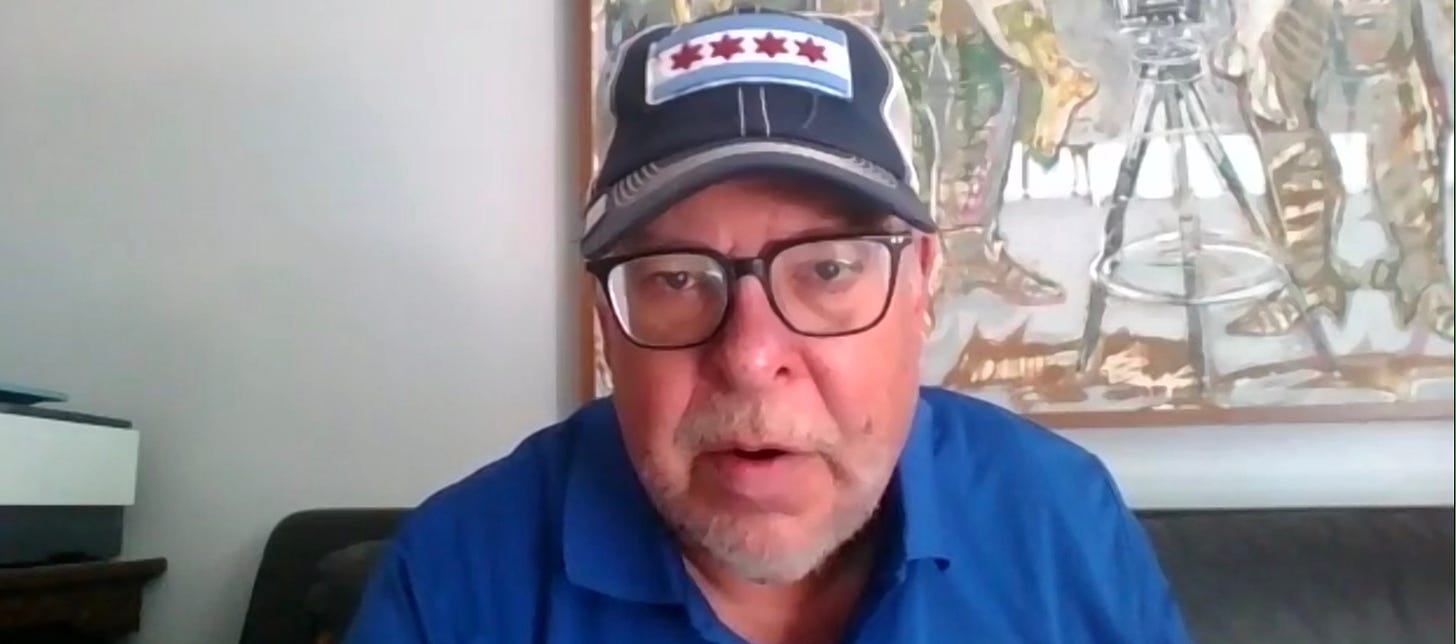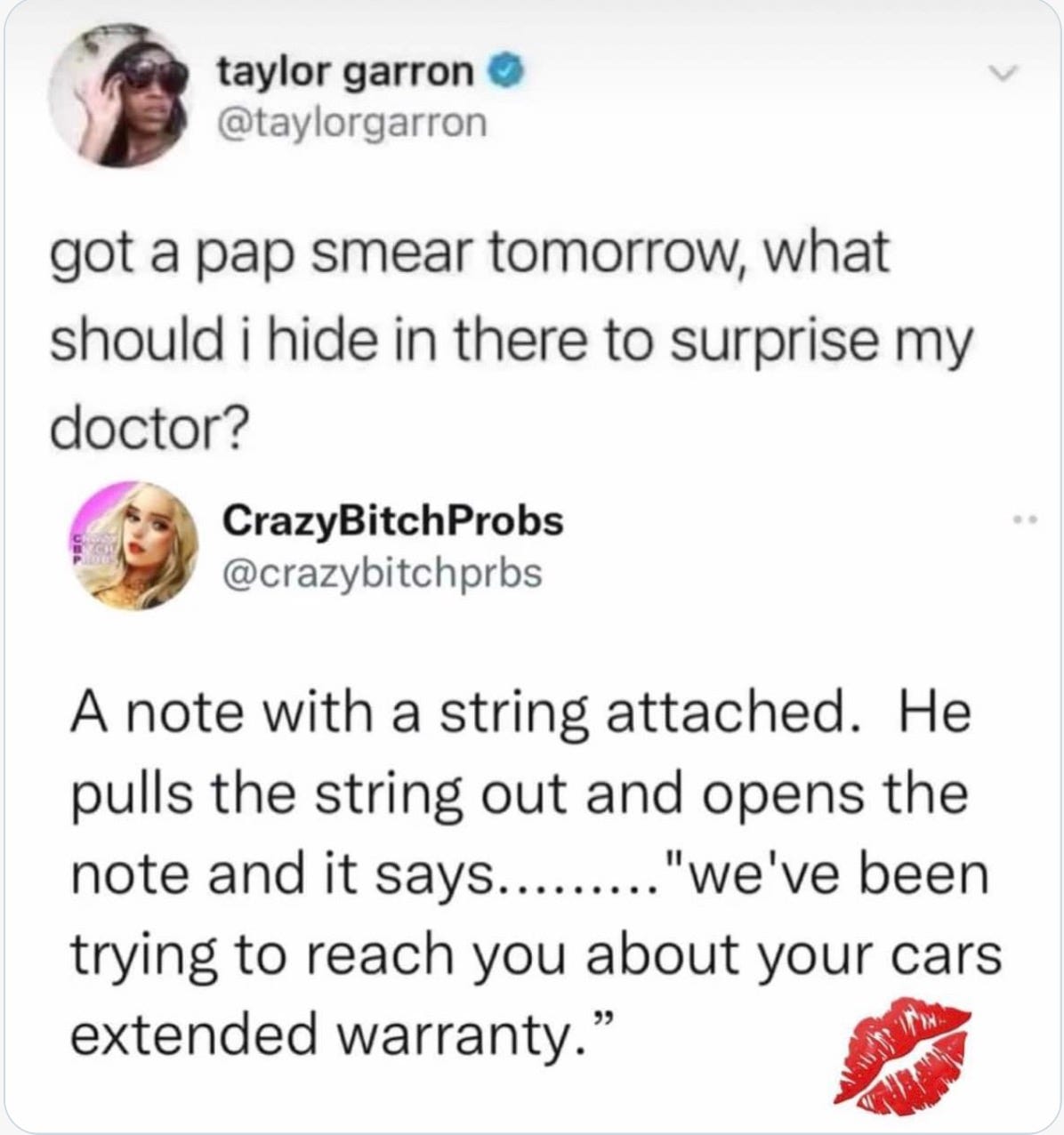8-11-2022 (issue No. 48)
Eric Zorn is a former opinion columnist for the Chicago Tribune. Find a longer bio and contact information here. This issue exceeds in size the maximum length for a standard email. To read the entire issue in your browser, click on the headline link above.
This week
An exit interview with retiring Daily Herald columnist Burt Constable
News and Views — on NASCAR, the Fifth Amendment and Groupon
Podcast Rx — Good listening for what ails you as prescribed by Johanna Zorn
Land of Linkin’ — Where I tell readers where to go
The bleat goes on — As long as John Kass keeps whacking at the Tribune, I’ll keep whacking back
The Mincing Rascals promo. This week featuring a teaser video
Re: Tweets — This week’s nominees and a link to an extra poll
The Tune of the Week — What I picked when I sought a favorite song by The Seekers
Until I know a lot more about what federal agents were looking for and what they found when they executed a search warrant at former President Donald Trump’s Mar-a-Lago estate, I’m withholding judgment about whether the operation was an overreach by the U.S. Department of Justice or a necessary measure to investigate a criminal act.
Those of us in Chicago are fairly accustomed by now to the feds searching the homes and offices of elected officials under scrutiny and carrying boxes of evidence out to waiting vans, and I don’t recall much if any partisan divide in the general enthusiasm expressed for such measures. Democrats and Republicans tend to approve of measures taken to detect, root out and put on trial corrupt politicians and government bureaucrats.
And I don’t recall a whole lot of second-guessing down the line when we’ve learned what was and wasn’t found during the execution of these search warrants.
Federal search warrants are not issued unilaterally or whimsically. As The New York Times explains:
Such a warrant … is used only when “it appears that the use of a subpoena, summons, request, or other less intrusive alternative means of obtaining the materials would substantially jeopardize the availability or usefulness of the materials sought,” according to the Justice Manual, the department’s official guidebook on criminal procedure.
Neither the Justice Department nor the F.B.I. has the authority to act unilaterally. A federal judge or magistrate must approve of the request, and jurists often demand highly specific limitations on the search to protect a person’s Fourth Amendment rights against unlawful search and seizure before granting a warrant.
Law enforcement agencies must meet certain legal benchmarks, litigated over decades, before a judge can sign off.
First, they must prove “probable cause,” evidence that the search is likely to find evidence of illegality; if the warrant is found to lack such proof, the search is considered unlawful under a 2004 precedent.
In addition, the courts have ruled that a search warrant should describe the location and nature of the search with “particularity” — to prevent agents from misusing a warrant to conduct a search that goes beyond the parameters of what has been specifically requested.
Is it possible that the FBI, led by a Trump appointee, concocted some bogus reasons to perform a fishing expedition at Mar-a-Lago and/or a Trump-hating magistrate judge overlooked brazen deficiencies or falsehoods in the warrant application in order to harass the former president? Sure, it’s possible. And it’s what Trump’s devoted followers have been braying ever since the news broke Monday night.
But Occam’s razor tells us it’s far more likely that, like in nearly all such instances, federal investigators made a compelling case to the judge.
Occam’s razor — named for the 14th century theologian William of Ockham and also called the principle of parsimony — is a tool of rational analysis that says the simplest explanation for a phenomenon is usually the correct one. I’ve heard it expressed as “when you hear thundering hooves, think horses, not zebras.”
In philosophy, a “razor” is guidance to those analyzing any situation to “shave away unnecessary assumptions,” such as, here, that a deep-state cabal is conspiring to use foul means to prevent Trump from winning back the White House in 2024.
Trump’s die-hard supporters will remain inflamed and agitated about the search — they are tendentiously referring to it as a “raid,” and some in the media are going along with the use of that misleading word — no matter what the evidence ultimately shows. They will argue that whatever the agent was found was either planted, insignificant or both. They will not be moved.
But Occam’s razor is likely to cut deep into those who today are merely skeptical and concerned, giving those who need it one more reason to look elsewhere for a candidate to back in 2024.
Likely but, as I say, not certain.
Last week’s winning tweet
Scroll down to read this week’s nominees or click here to vote in the new poll. I have also added another bonus all-politics Tweet of the Week poll.
Burt Constable, the exit interview
I met Burt Constable at the Lake County Courthouse in Waukegan in January 1988 when we were covering the wacky story of a legal dispute in which the state was seeking to seize a man’s two dogs on the grounds that they were actually wolves. As pretrial negotiations dragged on behind closed doors, Constable — then a Lake County reporter for the Daily Herald — and I — a suburban human-interest columnist for the Tribune nearly exactly his age — got chatting in the lobby.
The story fizzled when the state dropped its case rather than go to trial, but over the years I stayed in touch with Constable, who went on to get a thrice-weekly column in the Herald later that year that he kept writing for more than 34 years. We had lunch together or dinner with our wives every so often and traded emails. Last week, the Herald printed a pair of valedictory columns in which he announced that he was taking a buyout offer and retiring: “Prius, columnist are racking up miles on the way to the finish” and “This is my final column, but the thanks will continue.”
Here’s a jointly edited transcript of a conversation he and I had Monday afternoon:
EZ: First off, congratulations!
BC: Thanks. It feels pretty good not to have a Monday where I'm panicked about having deadlines for the rest of the week.
EZ: How did you make the decision to retire?
BC: Our newsroom has been closed because of the pandemic since March 2020, so the job had really changed. And since I turn 65 later this year, I started thinking that might be a good time to call it a career. Then the Herald sent out a note offering buyouts that added if they didn’t get enough people taking the buyout, there would be layoffs. So I thought, you know, I should be one of those people taking the buyout.
EZ: How many of your colleagues are leaving with you?
BC: There were eight of us. Media columnist Robert Feder, sports editor Mike Smith, assistant managing editor Renee Trappe, high school sports editor John Radtke, entertainment writer Scott Morgan and copy editors Amanda Erd and Jana Ronayne.
EZ: The story of your career begins down on the farm, right?
BC: Yes. We were a farming family in Goodland, Indiana, a small town north of Lafayette. And I was more of a math kid in high school. I was planning to go to Purdue University to study engineering, but then between my junior and senior years of high school I went to engineering camp at Purdue and that is what sold me on journalism.
There were about 60 of us at that camp, and only two of them were girls. I was into sports, and the other boys at camp were into Star Trek. I was like, “I don’t know about this.”
So on a whim, I applied to Northwestern University’s Medill School of Journalism, and they accepted me.
EZ: No offense, but based on what did they admit you?
BC: I’m thinking it was a form of affirmative action for kids from small rural towns. I looked really good on paper: I was a two-way starter on the football team, I played on the basketball and baseball teams, I was in the school play, I was senior class president. That would have been incredibly impressive at a school like New Trier, but what the admission office might not have noticed was that there were only 93 students in my graduating class. I also submitted a few writing samples that were evidently good enough.
EZ: Did you take to journalism right away?
BC: Not really. I'll tell you a story that’s somewhat humiliating. …
(The entire interview is posted here at ericzorn.com)
News & Views
News: City Council members are ripping the sweet deal that Chicago struck with NASCAR for a summer race series in Grant Park.
View: The lack of deliberative transparency under Mayor Lori Lightfoot has become increasingly disquieting. Lightfoot, who ran under the slogan “Bring in the Light!” to underscore her commitment to open government, has become something of an autocrat, and members of the City Council are justifiably frosted by the recently revealed terms of the NASCAR deal:
“Judging from the details we are just learning now, it’s pretty obvious why the (Lightfoot) administration forbade NASCAR from sharing the terms of the deal with the alderpersons who represent impacted communities,” (Ald. Brendan Reilly, 42nd) said in an email. “The more we learn, the worse this deal gets.”
“This contract is entirely deficient,” Reilly added. “Closing portions of Grant Park for up to a month and no access to Buckingham Fountain or the Petrillo Band Shell for weeks for less than $1 million in rent? That’s pennies on the dollar compared to Lollapalooza’s financial contributions. I also find it incredible that the city believes a $50,000 'security deposit' is sufficient for tens of millions of dollars worth of city infrastructure in and around Grant Park—for an auto race that sometimes involves major car crashes.”
The newly obtained 46-page permit agreement reveals an option to extend the deal for 2026 and 2027 as well. It also shows that NASCAR will be given a staging window for a portion of Grant Park west of Buckingham Fountain that will last for 21 days before the race and then 10 days after. …
"What we're doing is basically renting downtown and Grant Park to this private enterprise," 2nd Ward Ald. Brian Hopkins said. … "Compared to what we get from Lollapalooza — we get $6 million from Lollapalooza’s permit payments — we’re going to get under a million from NASCAR for tying up downtown and Grant Park during the summer," Hopkins said. … “This is a bad deal for the taxpayers. … The city left a lot of money on the table.”
I doubt voters will think of the upcoming races as a plus when they’re considering next year whether to reelect Lightfoot.
News: Former President Donald Trump invoked the Fifth Amendment rather than answer questions in a civil investigation into his business practices, and he disavowed his many earlier statements suggesting that those who exercise their right to remain silent are guilty.
View: If only hypocrisy were his worst offense! Trump invoked the Fifth Amendment 97 times at a deposition related to his 1990 divorce proceedings, then ripped Hillary Clinton’s staffers during the 2016 for taking the Fifth — "You see the mob takes the Fifth,” he said. “If you're innocent, why are you taking the Fifth Amendment?" and “If you’re not guilty of a crime, what do you need immunity for?”
As a matter of law, I support the Fifth Amendment’s right against self-incrimination. As a matter of common sense, though, I agree with indignant Trump circa 2016 that we are entitled to draw negative inferences when someone declines to answer relevant questions. And, as it turns out, the U.S. Supreme Court has held “that the Fifth Amendment does not forbid adverse inferences against parties to civil actions when they refuse to testify in response to probative evidence offered against them,” according to a New York State Bar Association analysis.
So the judge or jury in the New York civil litigation against Trump “may, but need not, infer by such refusal that the answers would have been adverse to the witness’ interest.”
Trump was trying in 2016 to take full political advantage of that common sense view many of us have. In 2022 one can only hope it comes back to bite him.
News: Chicago-based Groupon to lay off 500 employees, 15% of its total global workforce.
View: I never understood the hype surrounding Groupon, whose business model seemed easily replicable. But the company still seems to be chugging along even as it reorganizes. I’m glad some of the stories this week mentioned its appallingly tasteless Super Bowl ad that pivoted from an appeal to save the threatened culture of Tibet to a come-on for a deal on Tibetan food at a Chicago restaurant. Watch and cringe:
The company ran similar commercials exploiting concern for endangered whales and shrinking rainforests. In response, Conan O’Brien’s team created a mock Groupon ad that played off the Hindenburg disaster. (Tagline: “Oh! The frugality!”)
Johanna Zorn: Podcast Rx
Introducing an occasional feature written by my wife.
I feel quite lucky to have made a career out of doing what I enjoy most, listening to stories. First as a producer at WBEZ-FM, then as the executive director of the Third Coast International Audio Festival, and now as an independent editor and podcast consultant.
In the mid-1980s, Eric was writing a column about radio for the Tribune. I cold-called him to ask if he’d be a judge for the teen stand-up comedy contest I was organizing for WBEZ. I hoped this would inspire him to write about the contest for the paper, which he did. Flash ahead 36 years and three children later, now he’s hoping I’ll write every so often about my favorite podcasts for the Picayune Sentinel. It seems only fair.
The joy I take from listening to and sharing great audio storytelling has grown over the years, and the podcast era has been great for the medium. So many styles and choices, such a range of subject matter and intention. I’m here for all of it, but my favorite work consistently is narrative nonfiction. And sometimes I love a story that plays on the border of fact and fiction. My format of choice is almost always the limited series.
So, now you know my biases. As I told Eric when he offered me this unpaid gig, I’ll come out with recommendations from time to time. I’ll recommend only podcasts that I really enjoyed and want to share. By enjoy, I mean the story gets me so wrapped up, I feel I’m inside it.
Here are three I am prescribing for your August road trips:
Mother Country Radicals
History / Personal Narrative
A number of podcasts these days examine recent history in ways that tell us a lot about who we are as a country today. A perfect example of this is “Mother Country Radicals,” the inside story of the Weather Underground, a group of ‘60s radicals who became fed up with the ineffectiveness of peaceful marches for civil rights and against the Vietnam war and adopted Malcolm X’s slogan, “by any means necessary.” What did armed struggle really mean for a group of young, white mostly privileged folks and their families? And how do the choices they made 50 years ago — including detonating bombs and going on the run — resonate today? Beautifully written and narrated by Zayd Ayers Dohrn, son of Chicago-based former Weathermen Bernadine Dohrn and Bill Ayers, this 10-episode series vividly captures the unrest of the late ‘60s into the 1980s through memories, interviews and archival tape.
Banned
Timely / Intimate storytelling
We’re all witnessing the impact in real time of the Supreme Court’s recent decision in Dobbs v. Jackson Women's Health Organization that overturned the abortion-rights protections in Roe v Wade. This series takes us to where the case began, to the Jackson Women’s Health Organization, a clinic in Mississippi that sued the state over its ban on abortions after 15 weeks. “Banned” takes us to Jackson, Mississippi, getting to know the women who devoted their lives to the clinic, affectionately known as the Pink House, as well as the people depending on the health care services it offered. We also meet those who had been working locally to end access to abortion. Host and reporter Rosemary Westwood gains their trust and access, and as listeners we benefit.
Welcome to Provincetown
Travelogue / Character studies
The summeriest (by far) of all my suggestions, in that it literally takes place during summer in Provincetown on the tip of Cape Cod in Massachusetts. Host Mitra Kaboli doesn’t just go to Provincetown on a few reporting trip; she settles there alongside many others looking for fun, to find themselves, or to simply escape. As listeners, we’re along for the experience, and Kaboli transports us to a one-of-a-kind beach town where people can be free to be themselves. Which doesn’t mean that it’s always easy.
—Johanna Zorn
Land of Linkin’
Margaret Moffett reports on the slow fade of the Greensboro (North Carolina) News & Record: “Today, just six (journalists) are left to cover the news in a city of 300,000. Once-robust bureaus in High Point, Asheboro, and Eden have shuttered. There’s still a copy desk, but it designs and edits pages for multiple newspapers each night, with fewer and fewer eyeballs checking for errors in local articles. … ‘There are days when you open up the paper and find no original reporting,’ said Greensboro Mayor Nancy Vaughan. ‘Stories are being generated, good and bad. None of them are being covered.’”
“How Serious Is Amazon About Stopping Fake Reviews?” — “According to the fraudulent-review-detection service Fakespot, around 42 percent of 720 million Amazon reviews assessed in 2020 were bogus. … (But) ‘If Amazon deleted 100 percent of fake reviews, they would lose hundreds of billions of shareholder value,’ says Saoud Khalifah of Fakespot, who believes a full culling would show just how compromised the platform has become.”
In “Hear Me Out: Trump Won’t Run Again,” Slate’s Jeremy Stahl writes, “Maybe I’ll deeply regret writing this once Trump returns to power and locks up members of the press in defamation gulags at Gitmo, or maybe this will just be the kind of embarrassing headline that haunts me the rest of my professional life. But—as far as I see it—Donald Trump’s career as a realistic candidate for major office is over. There are a several reasons …”
I’ve added 44th Ward Ald. Tom Tunney to my Chicago Mayor’s Race Scoreboard under potential candidates, put Fraternal Order of Police chapter President John Catanzara and former state’s attorney candidate Bill Conway in the “out” category (Conway is running to replace retiring and indicted 34th Ward Ald. Carrie Austin), and I’ve moved Ald. Sophia King, 4th, into the “in” category. In 2019, there were 14 candidates on the mayoral ballot after Rahm Emanuel decided not to run for a third term. Other names will be added to the list of nine who are now in the race, and, inevitably, several names will drop off.
Here is that clip from the Little League game that shows sportsmanship at its very best. It reminded me of when opponents helped an injured softball player around the bases after a home run in 2008, and here is a 2014 update on that story.
The Picayune Sentinel on the air: On Thursdays at 4:30 p.m., WCPT-AM 820 host Joan Esposito and I chat about ideas raised in the new issue. The listen-live link is here.
The Picayune Sentinel preview: Tuesday at 11:30 a.m. I talk with WGN-AM 720 host John Williams about what’s making news and likely to be grist for the PS mill. The WGN listen-live link is here.
The bleat goes on
In Tuesday’s Picayune Plus, I responded to the several critics and many supporters of my coverage of John Kass’ feud with our former employer, the Chicago Tribune, by promising to revisit the topic here only sparingly and only in response to Kass’ amplifications of certain misrepresentations.
The good news for those who are tired of this subject and wish we’d all just move on is that Kass directly addressed the Tribune and its newsroom guild at his website Tuesday with the declarative statement: “I’m done with you.” So perhaps today will be our final visit to this topic!
The good news for those who take satisfaction in seeing the record set straight is that Kass devoted much of Tuesday’s post to promoting his twisted version of events, a version that was also the centerpiece of a guest column Sunday at his site from Texas-based scribe Steven Huntley.
If you’re interested, I lay out the whole story here. If you’re not interested, scroll on down to another wonderful offering from Mary Schmich.
Mary Schmich: Au revoir, Chef, merci
My former colleague Mary Schmich posts occasional column-like entries on Facebook. Here, reprinted with permission, is her most recent offering:
The drawing you see here was done by the great Chicago artist David Lee Csicsko, who sent it over when I asked if I could use it for this valedictory post to Chef Dominique.
Chef Dominique. That’s what Dominique Tougne was widely called. Or, simply, Chef.
He died in late July, out of the blue, of a heart attack. He was only 56. I was surprised by how personal the loss felt to me, though I hardly knew him. In the days since he died, I’ve seen how many share the sense of loss.
As best I can tell from Googling—correct me if I’m wrong—Chef Dominique’s death didn’t make the newspapers. I learned from a neighbor, who learned from the alderman’s newsletter.
I’ve since learned that the food website Eater did an obituary calling him “Chicago’s ambassador of French culture.” And the French consulate issued a statement: “His dedication to French culinary arts, his boundless generosity, and above all his authentic friendliness and joie de vivre will be deeply missed by all of us.”
When I moved to Chicago in 1985, there was still a palpable French influence, consisting largely of several French chefs who ran neighborhood places. Not fancy, fussy, snobby food. Just real, old-fashioned French cookin’.
But through the years, food from other countries and cultures has come into louder vogue, which made it all the more gratifying that Chef Dominique helped keep the French flame alive when he opened Chez Moi in Lincoln Park in 2012.
I learned only recently that Dominique came to Chicago in the 1990s to be the chef at Bistro 110 on the Gold Coast. Unlike Chez Moi, that restaurant was a big, crowded place that for a while was so hot you often couldn’t get a reservation.
Chez Moi was, is, different. Like Cafe Bernard that previously occupied the space, it’s a small, lively place with a neighborly feel. Chef Dominique could often be seen in the small, open galley kitchen between the front room and the back one, reaching for a knife, stirring a sauce, shaking a pan over the stove. He often wandered among the tables, a big, friendly presence with a gleaming bald head, a rich, French-inflected voice and a white chef’s coat.
I worried the restaurant wouldn’t survive the pandemic, but it did. In fact, in 2020, Chef Dominique and his general manager opened a companion cafe a block north on Halsted. It was called French Quiche. Open only in the daytime. Perfect for takeout.
It was there, at French Quiche, that Chef Dominique became a part of my daily routine. Almost every morning last fall and winter and through the cold early spring of 2022, I arrived with a book at the crack of 7 a.m., for the perfect cup of coffee and the perfect croissant.
I was often the first customer. Chef would always be seated at a back table in his white chef’s coat. He’d always look up and exclaim, “Bon jour!” I’d call back, “Bon jour!”
That was usually the extent of our conversation, but it was the dailiness of the exchange, the reliability, the exuberant cheer that made it special. Then the weather warmed up and my routines changed and I hadn’t been there in a couple of months when I heard he’d died.
We tend to underestimate the psychological effect of our encounters with people we don’t really know but often see and say hello to. The people—a waiter, a barista, a postal carrier— who give our routines meaning and a human touch, who make our lives better in ways we don’t grasp or acknowledge. Only when they’re gone do we notice a rip in the fabric of our lives.
On Sunday night I went with three friends to Chez Moi. I was glad to see it cheerful and busy. The food was as good as ever. Chef Dominique trained his sous-chefs well.
We were the last diners to leave. On the way out, we stopped to offer our waiter our condolences. He stopped wiping down the bar, looked up. What a shock it had been, he said. Tears came to his eyes.
“I can’t believe I won’t see him in the kitchen anymore,” he said.
But the coq au vin and the French onion soup and the salmon with cabernet sauce live on. Merci, Chef.
—Mary Schmich
Minced Words
We recorded a short video today before the podcast started. Usually there are more of us, but we were curious if people would find this kind of thing interesting to watch. I even put on a clean T-shirt for the occasion! The video ends when the podcast proper began:
Tribune political writer Rick Pearson joined me and host John Williams for this week’s episode of “The Mincing Rascals” podcast to talk about the search at Mar-a-Lago, developments in the race for governor, NASCAR’s contract with Chicago and more. Listen to the end to hear what Steve Bertrand had to say when Williams bragged about having run into Pearson at the Billy Goat Tavern earlier this week. Subscribe to us wherever you get your podcasts. Or bookmark this page. If you’re not a podcast listener, you can now hear an edited version of the show at 8 p.m. most Saturday evenings on WGN-AM 720.
No, dammit, I-57 does not go to Memphis!
This sort of misleading signage (pictured) on Chicago area expressways has always annoyed me, though only very slightly, I admit. Interstate 57 does not go Memphis. It terminates near Sikeston, Missouri about two hours south of St. Louis. To get to Memphis from there you have to drive another two hours on Interstate 55.
Republican state Rep.Mark Batinick of Plainfield is trying to do something about this very minor outrage. His House Resolution 891 notes that “Interstate 57 has many Illinois cities and towns of local and national fame and renown adjacent to its right-of-way within and through Illinois” and argues “directional signs that have been erected and maintained by Illinois tax money should direct motorists toward destinations that are located on the interstate highway of the same name.”
The resolution urges “the Illinois Department of Transportation (IDOT) to alter the directional signage that surrounds Interstate 57 to change the directional name of Interstate 57 heading south to a city or town that is located on Interstate within Illinois.”
Re: Tweets
In Tuesday’s paid-subscriber editions, I present my favorite tweets that rely on visual humor and so can’t be included in the classic Tweet of the Week contest where the template for the poll does not allow the use of images. Subscribers vote for their favorite, and I post the winner here every Thursday:
The new nominees for Tweet of the Week:
My neighbors aren’t used to being at home all day, and they're arguing a lot. This morning I heard them continually yelling "Shut up!" at each other every time I took a break from bagpipe practice. — @thewritertype
Me: I was doing Crossfit on the night in question. Cop: You’re not even a suspect. Me: I just wanted you to know. — @clichedout
You come into my house on this, the day of my Raisin Bran’s expiration? — @benedictsred
But most of all, I regret that my actions have led to negative consequences for me. — @Cpin42
That song is hilarious until somebody sneezes and you actually lose your meatball. — @Bob_Heller
A vacation with kids isn’t really a vacation. It’s just parenting in a different location where you don’t know where anything is. — @Lottie_Poppie
When I say, “That's neither here nor there,” it really means “I've forgotten what the hell my point was.” — @CynicalTherapi1
I want to be the guy who drops in on business meetings every now and then to say things like, “But does it scale?” How do I get that job? — @t0mcarmona
“Extramarital” sounds like it should mean “exceptionally marital”and that’s a fun little irony right there. — @UnFitz
Sorry we fell out of touch during COVID, but I have never liked you. — @dumbbeezie
I have also added another bonus all-politics Tweet of the Week poll. Here are those finalists:
Fox News did to our parents what they thought video games would do to us. — @ryan_scott
Some would even say the FBI moved on Trump like a bitch. — @gayguycandleco
Let's not begrudge young people spending all their money on lattes and avocado toast given they'll likely end up starving to death on an uninhabitable, burning world. In fact encourage them to have another slice while they still can. — @wildethingy
Maybe if they hadn’t said “Let’s go” to Brandon so many times he wouldn’t be getting so much done. — @RexHuppke
Who needs cheap insulin as long as we have affordable health insurance with full coverage?.*checks notes* Well fuck. — @BuckyIsotope
Sorry but if we let people choose their own gender then what's next? Something else that's none of my business and won't harm me in the slightest? I mean where does it end? — @MarthaKelly3
The good news: Republicans finally concerned over the possibility of law enforcement framing a person of color. The bad news: that color is orange. — @NeilSteinberg
Not every Republican is a White Nationalist. But every White Nationalist is a Republican. — @AmishSuperModel
First they came for Roger Stone, and I said “Great.” Next, they came for Alex Jones and I said, “Good news.” Then they came for Donald Trump and I said, This is also excellent. ” — @MNateShyamalan
Imagine if Obama had attempted to choke a Secret Service agent while wearing a tan suit. — @TheScottCharles
Vote here in that poll. For instructions and guidelines regarding these polls, click here.
Tune of the Week
Some of you of a certain age will remember the 1966 hit “Georgy Girl,” which reached No. 2 on the Billboard charts and was featured in the movie of the same name. I did, but I didn’t remember who performed it — The Seekers — until reading news reports last Friday that the Australian quartet’s lead singer, Judith Durham, had died at 79.
I dove into their catalog of hits on Spotify and came away enamored of this particular song, a moody ballad of lost love and a broken heart:
Now the harbour light is calling This will be our last goodbye Though the carnival is over I will love you 'til I die
Yes, I know, it sounds like the national anthem of Amightywindistan. But its folk roots are deep and authentic. Lyricist Tom Springfield (brother of Dusty Springfield) put original lyrics to the tune of the late 19th century Russian song “Stenka Razin.” Pete Seeger also borrowed that melody for his song “River of My People.” Nick Cave covered “The Carnival is Over” in a 1996 album.
Consult the complete Tune of the Week archive!
The Picayune Sentinel is a reader-supported publication. Simply subscribe to receive new posts each Thursday. To support my work, receive bonus issues on Tuesdays and join the zesty commenting community, become a paid subscriber. Thanks for reading!
.















Illinois I-57 signage destination: I nominate Metropolis!
Eric, something that you might need to add to the 'I was wrong list'. I have recently seen a number of people shaking hands. Including me, when I met a nice couple the man offered his hand, which I immediately shook and then his wife did the same. I also haven't seen any fist bumps or elbow bumps lately. The fear/stigma may be wearing off. But I bet if I had offered a fist, the other guy would have switched without any sense of ill manners. Especially since they were young and I'm old.